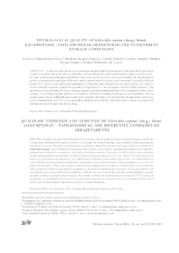Physiological quality of Gliricidia sepium (Jacq.) Steud. (Leguminosae - Papilionoideae) seeds subjected to different storage conditions.
Physiological quality of Gliricidia sepium (Jacq.) Steud. (Leguminosae - Papilionoideae) seeds subjected to different storage conditions.
Resumo: Studies of seed physiological processes represent the starting point for the sustainable utilization of native or cultivated plant species from the caatinga biome for which germination studies are still scarce. In order to determine adequate methods for the conservation of Gliricidia sepium seeds, the physiological quality of propagules exposed to different conditions and times of storage were examined. Recently collected seeds of G. sepium were analyzed immediately, while the other sample was stored for three, six, nine, or twelve months in plastic or paper bags under refrigeration or at room temperature for further analysis. The germination rates of seeds from each storage regime were determined and these rates compared to their water content. It was observed that germination capacity was directly related to changes in seed humidity. Storing seeds in plastic bags yielded the best conservation, mainly when they were stored at low temperatures. However, even at temperatures near 25°C it was possible to prolong seed viability when their water content was controlled through the use of impermeable packing.
Ano de publicação: 2012
Tipo de publicação: Artigo de periódico
Unidade: Embrapa Semiárido
Observações
1 - Por padrão são exibidas publicações dos últimos 20 anos. Para encontrar publicações mais antigas, configure o filtro ano de publicação, colocando o ano a partir do qual você deseja encontrar publicações. O filtro está na coluna da esquerda na busca acima.
2 - Para ler algumas publicações da Embrapa (apenas as que estão em formato ePub), é necessário ter, no celular ou computador, um desses softwares gratuitos. Sistemas Android: Google Play Livros; IOS: iBooks; Windows e Linux: software Calibre.
Acesse outras publicações
Acesse a Base de Dados da Pesquisa Agropecuária (BDPA) para consultar o acervo completo das bibliotecas da Embrapa.

